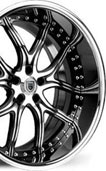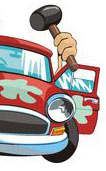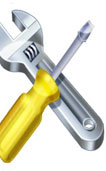Some Things To Know When Choosing A Shop For Insurance Repairs
You have the right to go to the repair shop of your choice. Your insurance company cannot require you to go to a particular shop.
- Your car is the second largest investment you’re likely to make. Preserve its value and your investment.
- Never drive a car that could be unsafe because of damages.
- There is no law requiring you to obtain more than one estimate.
- You have the right to go to the repair shop of your choice. Your insurance companycannot require you to go to a particular shop.
- Differences in repair estimates are common. A lower estimate may not include all the necessary work. If you’re not sure why one estimate is different from another you’ve received, please ask.
- Choose a shop that has unibody repair equipment and certified personnel.
- Ask if the shop will be using genuine manufacturer (OEM) replacement parts.
- Ask if the shop offers a repair warranty.
- Ask if the shop will negotiate your claim with the insurance company.
 MISCONCEPTION: The insurance company chooses which shop performs your vehicle repairs.
MISCONCEPTION: The insurance company chooses which shop performs your vehicle repairs.
FACT: The choice is yours, and yours alone. While there are networks of preferred providers for collision repair, and direct repair options presented to policyholders when they make a claim, the insured’s right to choose MUST always be upheld.
MISCONCEPTION: If the insurance company’s estimate is lower than the shop of your choice of shop, you must pay the difference.
FACT: According to state law, the insurance carrier must negotiate in good faith with your choice of shop to arrive at an agreed price for repairs. It is the role of the professional collision repairer to be an advocate for his or her customer by working with an insurer to document and identify physical damage.
MISCONCEPTION: Once an insurance company issues a check, you are responsible for any additional charges.
FACT: Any estimate is just that – an estimate. An appraiser can only report the damage which is visible. When additional damage becomes evident as the repair progresses, the shop will report the additional damage to the insurance company. In fact, most large collision repairs require at least one supplement to the original estimate.
MISCONCEPTION: You will be forced to use the repair shop with the lowest bid.
FACT: The choice of shops is entirely up to you. The repair facility which writes the lowest estimate is not necessarily the best place to have your car repaired. In fact, obtaining repairs from the low bidder is usually not in the best interest of the customer. When one considers the safety issues involved in collision repair, and the considerable investment one has in his or her vehicle, the value of quality repairs becomes clear. A modern, well equipped collision repair center represents an enormous investment in equipment, training and people. As is often the case with goods and service, one gets what one pays for.
MISCONCEPTION: Once a car has been in an accident, it will never be the same.
FACT: A collision brings about many changes to an auto. It is the role of the collision repair technician to restore the safety, function and appearance of your car to pre-accident condition. Using the latest in repair technology and original parts, your car is structurally rebuilt to its factory dimensions and tolerances. Then it is refinished using the finest automotive finish which, in many cases, will actually surpass the original finish insofar as corrosion protection and gloss retention. And, ALL OF OUR WORKMANSHIP, PARTS AND PAINT IS GUARANTEED.
MISCONCEPTION: My car will never be worth what it was prior to the accident.
FACT: Value retention and safety should be of primary concern to a collision repair customer. An inexpensive or otherwise poor repair will cause additional loss to a car owner in terms of their enjoyment of the car, safety, and return at trade-in. Substandard repairs, which often go unnoticed by consumers, can lead to premature failures of the repair, inconvenience, and/or liability. Individuals with leased vehicles should also be careful in selecting body shops. Substandard repairs, which often occur without their knowledge, can result in end-of-lease chargebacks.





